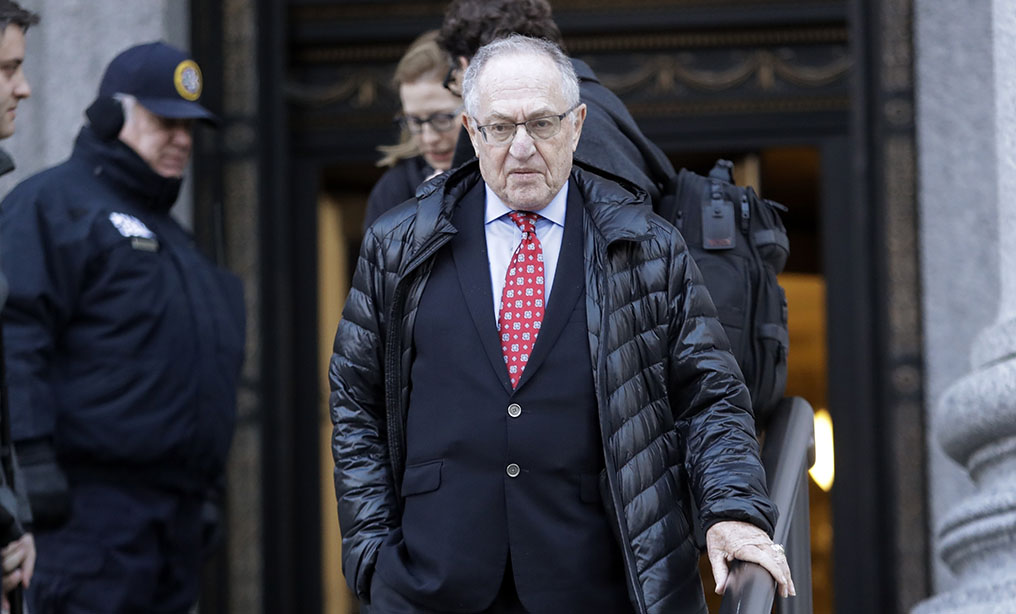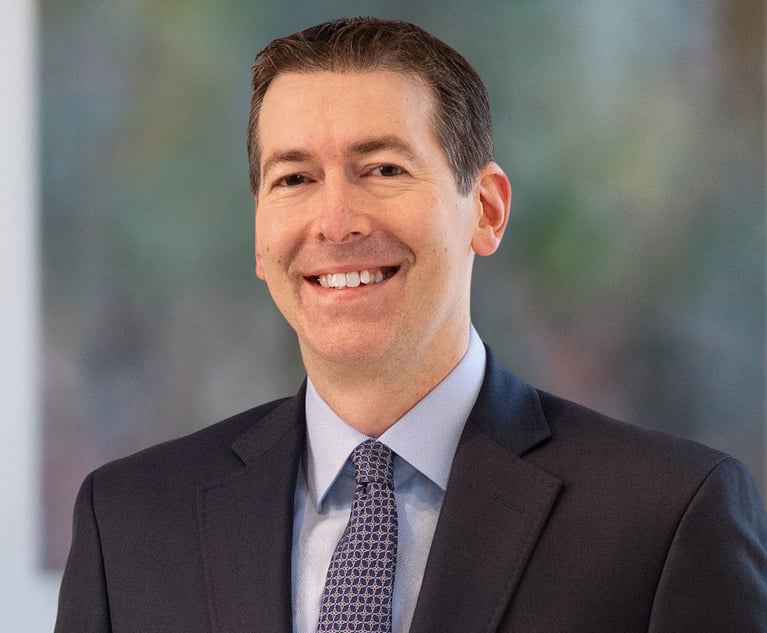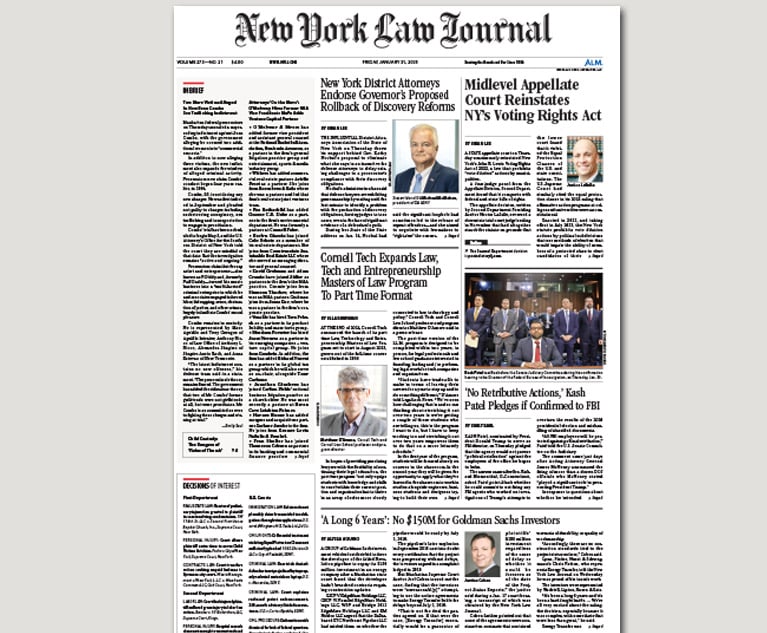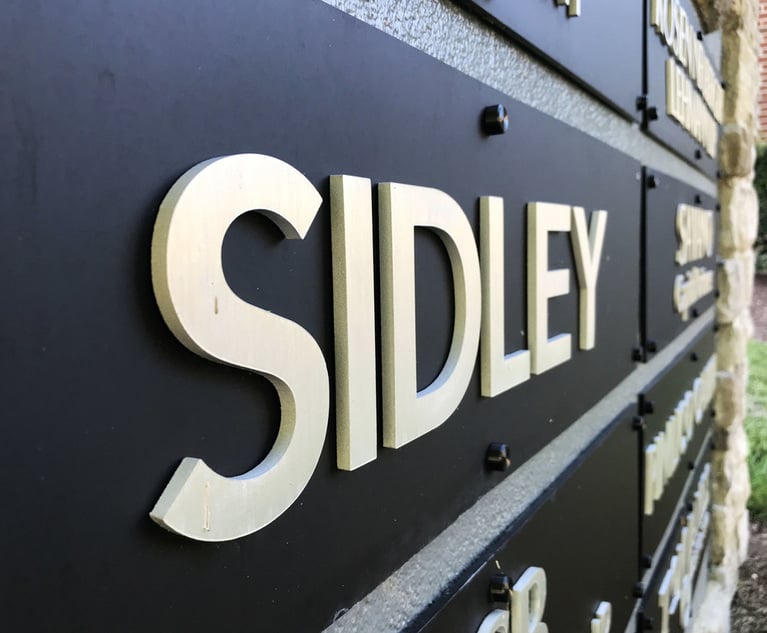Attorneys in Dershowitz Defamation Case Spar Over Production of Taped Audio Recording of David Boies
The conversation captured in both recordings has so far played an important role in the lawsuit, which accuses Dershowitz of defaming Giuffre in a series of public statements calling her a perjurer and a prostitute.
November 04, 2019 at 03:05 PM
5 minute read
 Alan Dershowitz leaves Manhattan federal court in March. Photo: Frank Franklin II/AP
Alan Dershowitz leaves Manhattan federal court in March. Photo: Frank Franklin II/AP
Former Harvard law professor Alan Dershowitz has filed legal papers in an effort to block an attempt by an accuser of Jeffrey Epstein to analyze an audio recording that could prove central to a contentious defamation case playing out in Manhattan federal court.
Dershowitz' attorneys Monday called the request to produce the analogue tape to third-party forensic firms a "wholly premature, if not improper" bid to access its contents ahead of discovery.
The recording, preserved on a microcassette, allegedly includes original audio of a 2015 phone conversation between Dershowitz and attorney David Boies, who until recently represented plaintiff Virginia Giuffre in the defamation suit.
Dershowitz has said that during the call, Boies, the chairman and managing partner of Boies Schiller Flexner, disparaged his own client's case and expressed doubt regarding Giuffre's claims that she was trafficked by the deceased financier and forced to have sex with Dershowitz and other powerful men.
Dershowitz, who has repeatedly and forcefully denied those allegations, has made the substance of the conversation a key part of his defamation defense in the case, claiming that Giuffre had conspired with her former attorneys to extort him with false allegations of forced sex.
U.S. District Judge Loretta A. Preska of the Southern District of New York last month ordered Dershowitz to provide forensic firm Stroz Friedberg with a digital recording of the call to make a copy for both sides of the litigation. Dershowitz later turned over the microcassette, which is believed to hold the original audio of the conversation.
No content from the tape have been made publicly available.
In a Nov. 1 letter, Giuffre's attorney, Charles "Chuck" Cooper, said the digital recording was only a "partial recording," which rendered chunks of dialogue "either incomprehensible or wholly inaudible." The poor quality, he argued, raised "grave concerns" about the accuracy of sealed transcripts that Dershowitz had previously provided to the court.
"Many of the words Mr. Dershowitz records in these transcripts simply cannot be discerned with any degree of confidence on the recording he provided," said Cooper, a conservative legal luminary and chairman of the Washington firm Cooper & Kirk.
As a result, Cooper said, "expert analysis of the microcassette is imperative" to determine the true contents of the conversation. The problem, however, was that Stroz Friedberg lacked the ability to analyze analogue storage devises or even to extract the audio they hold. Instead, he asked Preska for an order requiring Stroz to send the tape to forensic firms with the capability to do so.
On Monday, an attorney for Dershowitz said the request was simply a stab at "unilateral pre-answer discovery," and countered that the microcassette should be returned to the defense.
"Plaintiff's contentions as to accuracy and audibility of the recording are issues for trial, or to be explored during discovery," Aidala Bertuna & Kamins attorney Imran H. Ansari wrote in a two-page letter.
"If and when Mr. Dershowitz seeks to admit the tape into evidence, it will be his burden to establish authenticity and audibility, and arguably, if he did not to seek its admission, further forensics would not be needed," he said.
Ansari also raised concerns about potential damage to the tape if it was transferred "between multiple third-parties."
As of Monday afternoon, Preska had not ruled on either of the competing proposals.
The conversation captured in both recordings has so far played an important role in the lawsuit, which accuses Dershowitz of defaming Giuffre in a series of public statements calling her a perjurer and a prostitute.
Dershowitz had said he planned to put Boies and partner Sigrid McCawley on the stand at trial. And last month he succeeded in having Boies Schiller disqualified under the "witness-advocate" rule, which bars attorneys from participating in cases where other lawyers in their firm might be called as witnesses.
Giuffre hired Cooper to take over the case last week, on Boies' recommendation. Boies and McCawley, longtime attorneys for Giuffre, both intend to continue to represent her in other matters.
In an interview, Boies disputed Dershowitz' characterization of their phone call and said the former professor was using only snippets of the recording to take the discussion out of context. He challenged Dershowitz and his team instead to make the full contents public, and "let people decide for themselves" what actually was said.
"If Alan Dershowitz had a tape that was helpful to him, he would have made it public by now," he said.
Dershowitz was not immediately available to comment, and Cooper did not return a call Monday afternoon seeking comment on the recent filings.
Attorneys from both sides are expected back in court later this month.
The case is captioned Giuffre v. Dershowitz.
Read More:
Boies Schiller Attorneys Disqualified in Dershowitz Defamation Case
Defamation Lawsuit Pits Alan Dershowitz Against Epstein Sex Trafficking Accuser
This content has been archived. It is available through our partners, LexisNexis® and Bloomberg Law.
To view this content, please continue to their sites.
Not a Lexis Subscriber?
Subscribe Now
Not a Bloomberg Law Subscriber?
Subscribe Now
NOT FOR REPRINT
© 2025 ALM Global, LLC, All Rights Reserved. Request academic re-use from www.copyright.com. All other uses, submit a request to [email protected]. For more information visit Asset & Logo Licensing.
You Might Like
View All
Orrick Hires Longtime Weil Partner as New Head of Antitrust Litigation

Profits Surge Across Big Law Tiers, but Am Law 50 Segmentation Accelerates
4 minute readTrending Stories
- 1The Law Firm Disrupted: Scrutinizing the Elephant More Than the Mouse
- 2Inherent Diminished Value Damages Unavailable to 3rd-Party Claimants, Court Says
- 3Pa. Defense Firm Sued by Client Over Ex-Eagles Player's $43.5M Med Mal Win
- 4Losses Mount at Morris Manning, but Departing Ex-Chair Stays Bullish About His Old Firm's Future
- 5Zoom Faces Intellectual Property Suit Over AI-Based Augmented Video Conferencing
Who Got The Work
J. Brugh Lower of Gibbons has entered an appearance for industrial equipment supplier Devco Corporation in a pending trademark infringement lawsuit. The suit, accusing the defendant of selling knock-off Graco products, was filed Dec. 18 in New Jersey District Court by Rivkin Radler on behalf of Graco Inc. and Graco Minnesota. The case, assigned to U.S. District Judge Zahid N. Quraishi, is 3:24-cv-11294, Graco Inc. et al v. Devco Corporation.
Who Got The Work
Rebecca Maller-Stein and Kent A. Yalowitz of Arnold & Porter Kaye Scholer have entered their appearances for Hanaco Venture Capital and its executives, Lior Prosor and David Frankel, in a pending securities lawsuit. The action, filed on Dec. 24 in New York Southern District Court by Zell, Aron & Co. on behalf of Goldeneye Advisors, accuses the defendants of negligently and fraudulently managing the plaintiff's $1 million investment. The case, assigned to U.S. District Judge Vernon S. Broderick, is 1:24-cv-09918, Goldeneye Advisors, LLC v. Hanaco Venture Capital, Ltd. et al.
Who Got The Work
Attorneys from A&O Shearman has stepped in as defense counsel for Toronto-Dominion Bank and other defendants in a pending securities class action. The suit, filed Dec. 11 in New York Southern District Court by Bleichmar Fonti & Auld, accuses the defendants of concealing the bank's 'pervasive' deficiencies in regards to its compliance with the Bank Secrecy Act and the quality of its anti-money laundering controls. The case, assigned to U.S. District Judge Arun Subramanian, is 1:24-cv-09445, Gonzalez v. The Toronto-Dominion Bank et al.
Who Got The Work
Crown Castle International, a Pennsylvania company providing shared communications infrastructure, has turned to Luke D. Wolf of Gordon Rees Scully Mansukhani to fend off a pending breach-of-contract lawsuit. The court action, filed Nov. 25 in Michigan Eastern District Court by Hooper Hathaway PC on behalf of The Town Residences LLC, accuses Crown Castle of failing to transfer approximately $30,000 in utility payments from T-Mobile in breach of a roof-top lease and assignment agreement. The case, assigned to U.S. District Judge Susan K. Declercq, is 2:24-cv-13131, The Town Residences LLC v. T-Mobile US, Inc. et al.
Who Got The Work
Wilfred P. Coronato and Daniel M. Schwartz of McCarter & English have stepped in as defense counsel to Electrolux Home Products Inc. in a pending product liability lawsuit. The court action, filed Nov. 26 in New York Eastern District Court by Poulos Lopiccolo PC and Nagel Rice LLP on behalf of David Stern, alleges that the defendant's refrigerators’ drawers and shelving repeatedly break and fall apart within months after purchase. The case, assigned to U.S. District Judge Joan M. Azrack, is 2:24-cv-08204, Stern v. Electrolux Home Products, Inc.
Featured Firms
Law Offices of Gary Martin Hays & Associates, P.C.
(470) 294-1674
Law Offices of Mark E. Salomone
(857) 444-6468
Smith & Hassler
(713) 739-1250








